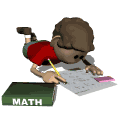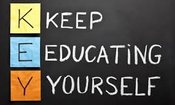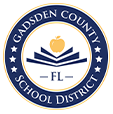EXCEPTIONAL STUDENT EDUCATION AND STUDENT SERVICES

Our goal is to provide every student with a "free appropriate public education" (FAPE); to help exceptional students progress in school, access the general curriculum, and prepare for life after school.
We have developed programs that serve our students in the most effective way possible. To ensure that our students receive appropriate services, we provide training to teachers, school staff, administrators, support staff, and others. Our trainings focus on current instructional practices and other important issues.
In addition, the Gadsden County School District provides trainings and materials to help parents understand their child's exceptionality, their child's right to a "free appropriate public education", and the processes and activities that are involved in exceptional student education. We provide activities that encourage parent involvement and collaboration between parents and professionals. Extra effort is put forth to ensure that students and families receive quality services. We are committed to making a difference in the lives of all students.
Sharon B. Thomas, Director
- Documents
- Student Services
- Gifted Education
- Contact
- Links
- Photo Album
- Multi-Tiered System of Supports (MTSS)
- Professional Development: Workshops and Trainings
Student Services
The Exceptional Student Education and Student Services Department provides services to all Gadsden District Schools. Services we provide include:
RTI/MTSS guidance support
Interventions
Diagnostics
Psychological Services
Counseling (including Grief Counseling)
Early Intervention
Child Find (2-5 years-old)
Screenings/Evaluations
Developmentally/age-appropriate classes
Parent Liaison
Continuum of Specialized Instruction/Services
Consultation
Support Facilitation
Resource Room
Separate Class
Separate Day School
Hospital/Homebound
Home Instruction
Specialized Instruction Teachers
Behavior Specialists
Behavior Management Consultants
Mental Health Counselors
Paraprofessionals
Speech/Language Pathologists
Vision Specialist
Occupational Therapists
Physical Therapists
Gifted Education Teacher(s)
Employment Specialist(s)
Transition Program (18-22 year-olds)
Section 504 compliance
Parent Education
Staff Professional Development
Regional LATS
Attendance Intervention and Truancy Reduction Support
Positive Behavior Intervention Plans
Gifted Education

The evaluation procedures and measurements that are used to determine Gifted eligibility in Gadsden are in compliance and aligned with state criteria. The student must demonstrate a need for a special program, demonstrate a majority of the characteristics of gifted students, and demonstrate superior intellectual development to meet the state's criteria for gifted eligibility, known as Plan A. Gadsden also implements a District Plan B as an alternative plan to assist with increasing the participation of underrepresented groups: Limited English Proficient (LEP/ELL) and low socioeconomic status (SES), who may demonstrate a need for a special instructional program. Under Plan B, the criteria allows for academic identification with a revised intellectual score. However, students must still demonstrate gifted characteristics and a need for a special instructional program.
Efforts are made to ensure that students enrolled in grades 1-12, who are identified as Gifted, are afforded an opportunity to participate in an academically rigorous and exciting curriculum. Students receive either direct or consultation services at their enrolled school, including the district's charter school. The goal is to provide a Gifted Program so that eligible students may participate in content/grade level curriculum acceleration, and access instruction that is designed to promote critical thinking, creativity, and leadership skills.
In essence, we are having an exceptionally enjoyable time educating our exceptional population! For more information regarding Gifted Education, please visit the following websites:
This survey is for parents of students with individual educational plans (IEP) receiving special education services during the 2019-2020 school year. All information provided will remain confidential. You may submit one online survey for each child receiving services.
procedural safeguards, are intended to ensure that you have the opportunity to be a partner in the educational decisions made regarding your child.
Multi-Tiered System of Supports (MTSS)
Parent involvement in general education intervention procedures
Review Data
Implementation of evidence-based interventions
~The interventions selected for implementation should be determined by a team through a data-based problem-solving process that uses student performance data to identify and analyze the area(s) of concern, select and implement interventions, monitor effectiveness of the interventions and modify intervention or intensity when needed.
~Interventions must be implemented as designed for a period of time sufficient to determine effectiveness, and with a level of intensity that matches the student's needs.
~The district must collect pre-intervention and ongoing progress-monitoring data regarding academic or behavioral areas of concern and communicate the data to the parents in an understandable format, which may include, but is not limited to, graphic representation.
Exceptions to requirement for general educaiton interventions
~Not required for children younger than kindergarten entry age
~Not required for students suspected of being gifted as described in the Rule 6A-6.03019, F.A.C.
~Not required for students who are being considered for eligibility for specially designed instruction for students who are homebound or hospitalized as described in Rule 6A-6.03020, F.A.C.
~Not required for students who are not enrolled in a public school.
AUTISM 101

CPI TRAINING
With the unique situation this school year, CPI has been flexible with the date requirement. In order to maintain CPI certification, participants will need to complete a CPI Refresher training by the end of February 2021.
A Flyer has been attached under Related Documents for the January/February 2021 CPI Refresher training. The January 13th session is closed but they may register for any of the other dates. The flyer for this training is posted under Related Documents. You may click from on the Registration Link to register.
Independent Study Course Descriptions
Below is a list of currently available courses. Note: If you need in service credit to recertify by June 30th of the current year, please familiarize yourself with your district deadlines.

